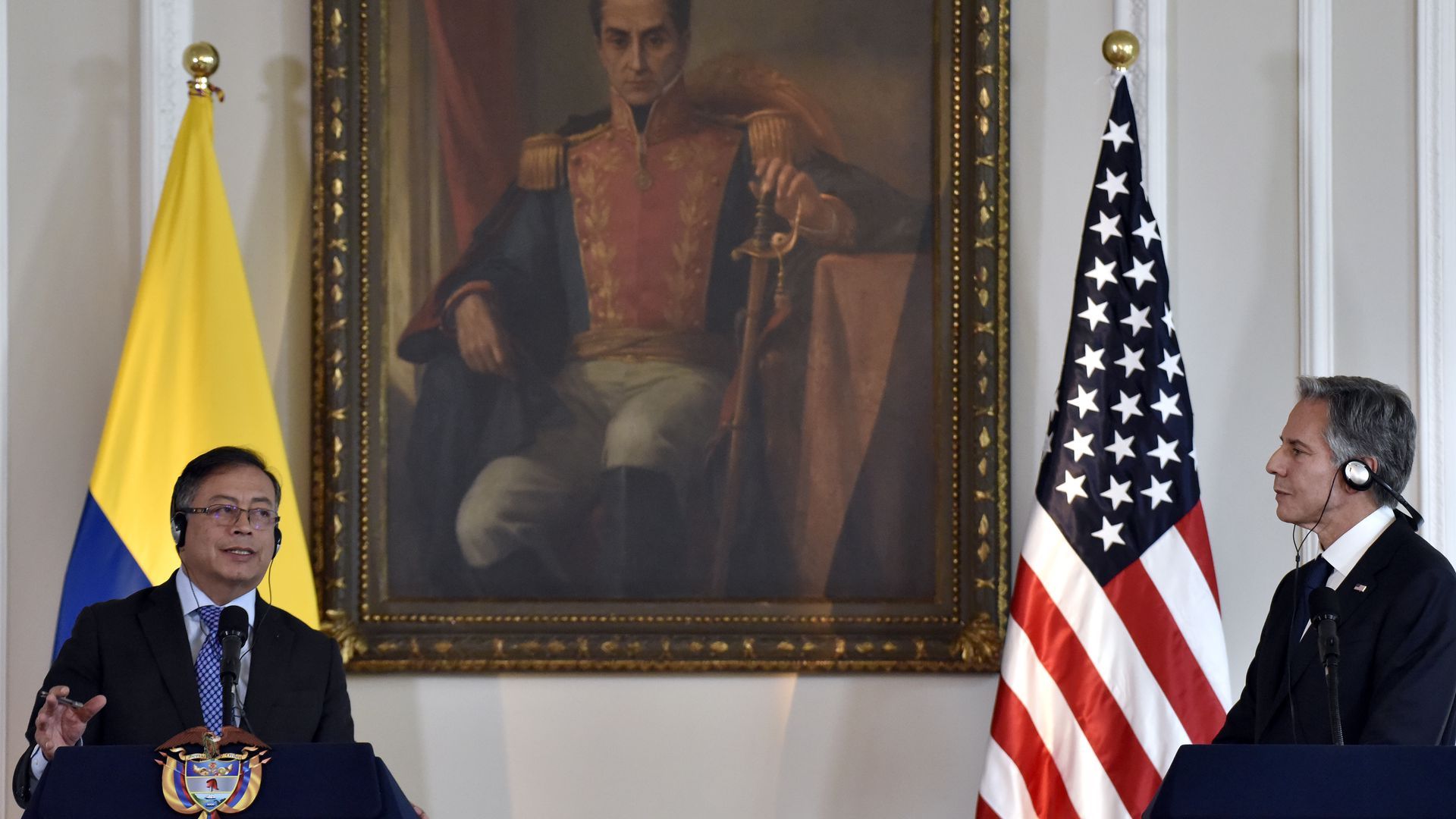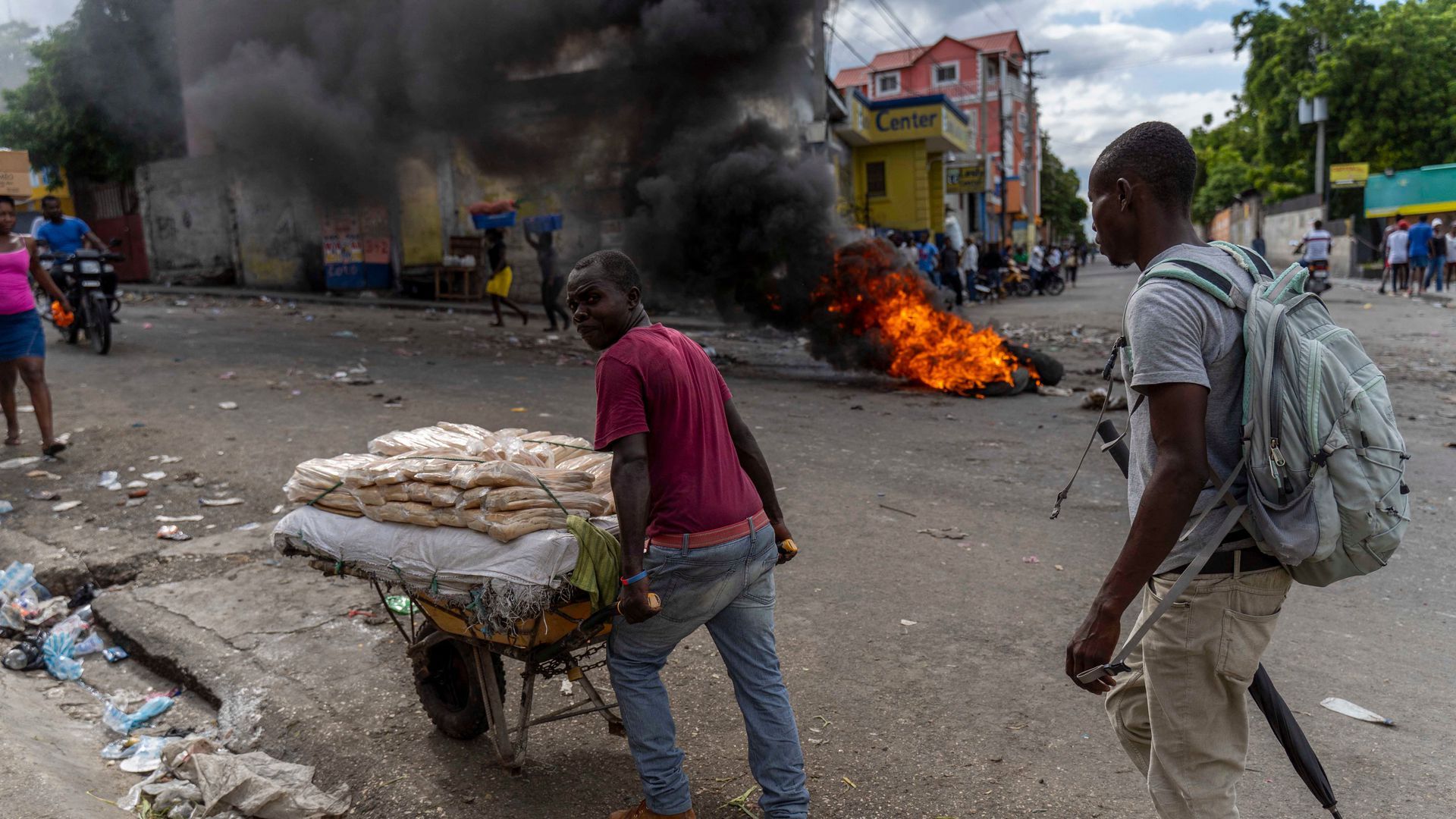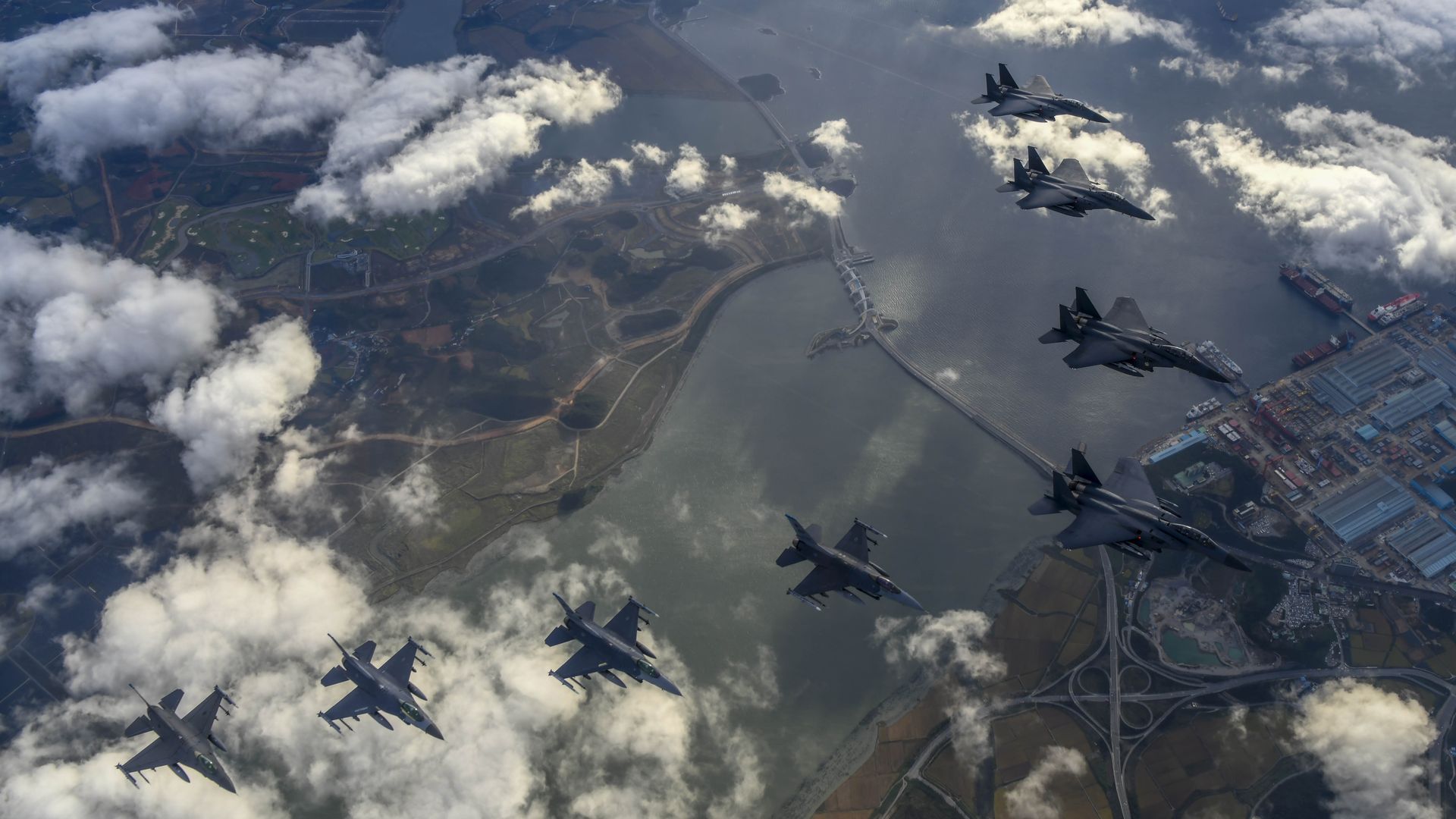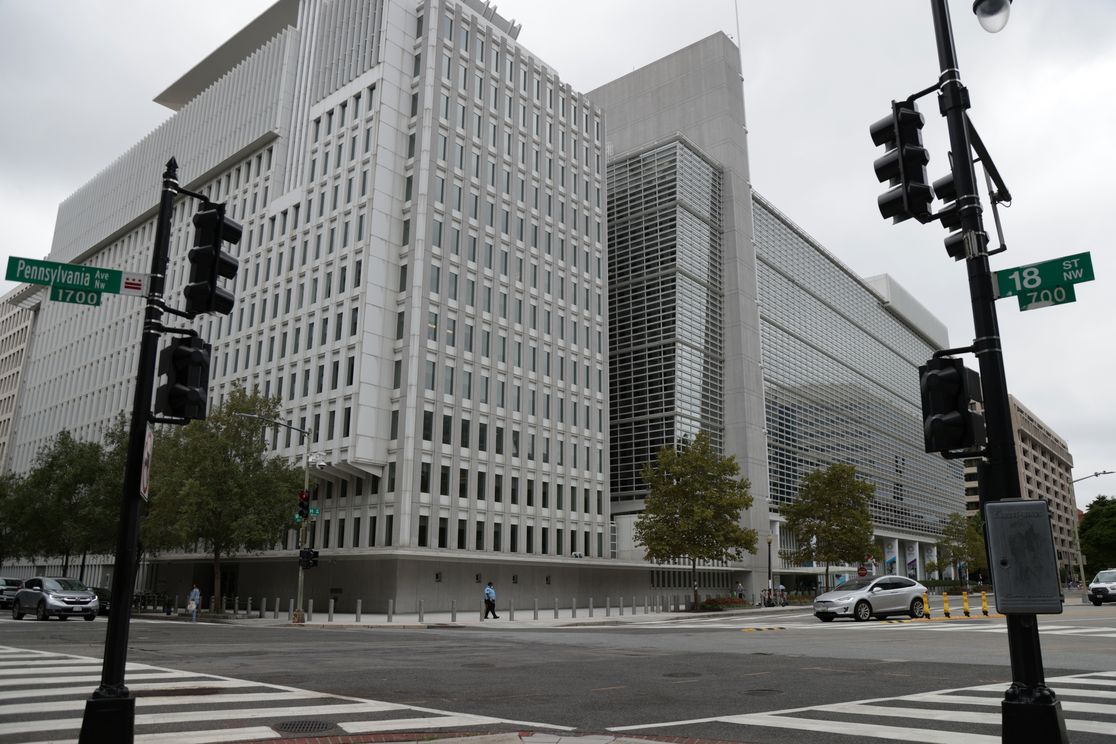| | | | | | | Presented By Babbel | | | | Axios World | | By Dave Lawler · Oct 13, 2022 | | Welcome back to Axios World. - We start tonight's edition (1,729 words, 6½ minutes) in Paris. I've just returned after some great meals and great meetings — thanks to all of you who sent recommendations.
New arrival? Subscribe. | | | | | | 1 big thing: Inside the French effort to counter Russia in Africa |  | | | The flags of Russia and Burkina Faso are raised after a coup in Ouagadougou. Photo: Issouf Sanogo/AFP via Getty Images | | | | A different red, white and blue striped flag has appeared during recent demonstrations in francophone West African capitals: Russia's. Driving the news: That scene played out most recently during Burkina Faso's Sept. 30 coup. Protesters attacked the French embassy and a French cultural center amid rumors that France was harboring the ousted president or planning to intervene militarily. That was all disinformation, French officials say. They point the finger at Russia. - Similar anti-France demonstrations and attacks on French missions have taken place in Mali and Chad.
- That's left officials in Paris trying to assess just how widespread pro-Russian and anti-French sentiments are in the volatile Sahel region — and where exactly those flags are coming from.
Behind the scenes: 10 senior French officials, who declined to be named, briefed Axios and two other U.S. news outlets on France's evolving strategy in Africa during meetings in Paris this week. One name kept popping up in those meetings: Yevgeny Prigozhin, the oligarch and Putin ally who founded the Wagner Group and allegedly oversees an army of online trolls. - The latest French estimate is that 2,400 Wagner mercenaries are in Africa, primarily in Mali and the Central African Republic. Both countries have effectively cut ties with France in favor of Russia.
- Wagner has also popped up, with mixed results, in Libya, Madagascar and Mozambique.
France had remained the dominant power in West Africa long after decolonization, but Russia's influence appears to be growing there despite the war in Ukraine. - French officials believe Prigozhin and perhaps the Kremlin itself are funding online campaigns and local NGOs that spread anti-French narratives.
- Moscow has long denied links to Wagner, though state media has recently celebrated the shadowy group's role in Ukraine.
- The Kremlin has also increased its overt outreach to African leaders in recent years, with Foreign Minister Sergey Lavrov making several visits.
The French armed forces have established an information warfare unit focused on spotting and countering "information attacks" flowing from Russia. - That's part of a strategy to "neutralize Wagner in Africa" by making the case that the group does not provide security, but brings "murder and exploitation," one official says.
- France claimed earlier this year to have thwarted an attempt by Wagner mercenaries to dig a mass grave in Mali and blame it on French troops.
- "We're not competing with Wagner, we're competing with a Russian effort to expel France and the West from Africa," the same official contends, adding: "We are really busy."
Between the lines: Some of the anti-French sentiment that spreads online is drawn from the brutal colonial history. But one senior official says it's mostly driven by the failure to defeat extremist groups. "We are associated with this failure." The backstory: French troops completed their withdrawal from Mali in August after nine years battling an Islamist insurgency there that metastasized throughout the region - Junta leader Assimi Goïta, who took power in a 2020 coup, pushed the French out of Mali and reportedly welcomed in Wagner, though he claims to only be working with "Russian trainers."
- French troops continue to operate out of Niger. There were anti-French protests there last month too, also featuring Russian flags.
- In a shift aimed at changing the narrative, French officials want to keep their military operations under the radar and focus more attention on the hundreds of millions of euros they're providing in aid and development projects.
Wagner, by contrast, is seeking to turn a profit as it establishes footholds in some of the poorest and most lawless places on earth, one French official says. - "Russia is not China. They have never built a bridge in Africa," the official adds.
- Western governments and the UN accuse the group of committing widespread human rights violations and exploiting natural resources like diamonds and timber.
- French officials believe word of those abuses will spread, and few countries outside of failed states will have any interest in Wagner. In the meantime, they know they have a fight on their hands.
|     | | | | | | 2. The view from Paris on Ukraine |  | | | Rare spotting of Ukrainian flags in Paris. Photo by your author as he enjoyed un café noisette. | | | | French President Emmanuel Macron today ruled out a nuclear response to a Russian nuclear attack in Ukraine, tweeting "We do not want a World War," and added that French military assistance is to help Ukraine defend itself, "never to attack Russia." Between the lines: France is more cautious in its rhetoric than some allies, officials say, so as not to exacerbate the narrative that somehow NATO is the aggressor. - "There is an ugly debate between the Europeans," with the French and Germans emphasizing the war won't end without diplomacy and countries including Poland and the Baltic states "out for the skin of Putin," says Gérard Araud, a former senior French diplomat who served most recently as ambassador to the U.S.
- He notes that the Polish prime minister told Macron "nobody negotiated with Hitler."
- Still, Macron is speaking far less with Vladimir Putin than earlier in the war and emphasizing that his priority is to help Ukraine succeed militarily.
The big picture: Araud notes that while Ukraine dips in and out of the news agenda in the U.S., it's consistently a top focus in France — naturally, perhaps, given the relative proximity of the fighting. - Indeed, Ukraine led TV news coverage and the front page of Le Monde all week.
- Polls suggest French public opinion is strongly behind Ukraine, even as energy prices are rising and far-right leader Marine Le Pen is arguing the "useless" sanctions should be scrapped.
I was, however, a bit surprised to note that unlike in Washington, I didn't see many Ukrainian flags on display at homes and businesses around Paris. - Araud says that comes down to cultural differences. "The idea of having a flag in front of your house, you know, it would be considered very kitschy."
|     | | | | | | 3. 143 countries condemn Russia's annexations |  Data: United Nations; Map: Erin Davis/Axios Visuals A resolution to condemn Russia's annexations in Ukraine passed Wednesday by a whopping 143 to 5 margin, though 45 countries including China, India and Iran abstained or declined to vote. View interactive map. |     | | | | | | A message from Babbel | | Polish up your Polish — or 13 other languages | | |  | | | | Not only can you learn to say "dziękuję ci" ("thank you" in Polish!) with Babbel, but it also helps get your pronunciation right from the start. A language learning platform developed by 150 linguists, Babbel has lessons, exercises, videos and more. Speak a new language in as little as three weeks. | | | | | | Bonus: Where in the world? |  | | | Photo: Nicolas Asfouri/AFP via Getty Images | | | | Photo: Alex Wong/Getty Images Photo: Christian Charisius/picture alliance via Getty Images Can you name these three buildings, what city they're in, and what events they are currently hosting or will soon host? Scroll to the bottom for the answers. |     | | | | | | 4. A new era in the drug war |  | | | Colombian President Gustavo Petro (L) meets Secretary of State Antony Blinken in Bogotá on Oct. 3. Photo: Guillermo Legaria/Getty Images | | | | Colombian President Gustavo Petro is attempting a dramatic shift in how his country fights drug trafficking. Why it matters: Counter-narcotics operations are a cornerstone of the U.S. relationship with Colombia, long one of its closest partners in Latin America. - While U.S. Secretary of State Blinken signaled openness to Petro's new approach during a visit to Bogotá last week, the transition won't be easy.
The big picture: In an effort to fight cocaine production, the U.S. and the Colombian military have historically coordinated to eradicate coca at the source while the Colombian army has tried to capture or kill leaders of armed groups. - The strategy is entrenched by the fact that U.S. funding is directly tied to coca eradication, argues Elizabeth Dickinson, Colombia analyst at the International Crisis Group.
- The coca fields are often quickly replanted, she notes, and the process punishes poor farmers. Eradication also does little to prevent violent turf wars between armed groups
What's new: Petro, himself a former member of the defunct M-19 guerrillas, told the UN General Assembly last month that "the war on drugs has failed" and drenched his country in blood. - Petro wants to reduce illegal crops — targeting only "industrial" production, not small farmers — and to invest in agriculture to provide better alternatives to coca.
- He also wants to focus resources on investigating money laundering and increasing seizures at sea.
- At a press conference alongside Blinken last week, Petro requested U.S. intelligence support to pursue "the true owners of drug trafficking."
State of play: Blinken said the U.S. and Colombia are "in sync" over this "holistic approach," but it remains to be seen whether the U.S. will shift resources accordingly. Go deeper: Colombia to restart peace talks with last major rebel group |     | | | | | | 5. From the Axios files |  | | | A bread vendor pushes his cart past a burning barricade during a protest against Haitian Prime Minister Ariel Henry. Photo: Richard Pierrin/AFP via Getty Images | | | | 1. Haiti's government has requested armed intervention and aid to help stabilize the country, which has been rocked by widespread violence, fuel access blockaded by gangs, and a cholera outbreak, Axios' Stef Kight writes. - Driving the news: The White House is considering that request and imposing visa restrictions on some officials implicated in the unrest. A U.S. interagency delegation, including officials from the State Department and Pentagon, will travel this week to Port au Prince.
- Go deeper.
2. The White House says President Biden will "continue to re-evaluate" the U.S. relationship with Saudi Arabia after OPEC+ opted to significantly cut oil production in response to falling fuel prices, Axios' Jacob Knutson writes. - Bob Menendez, chair of the Senate Foreign Relations Committee, went further, calling for a "freeze" on cooperation with Saudi Arabia, including arms sales.
3. The Federal Communications Commission plans to ban all sales of new Huawei and ZTE telecommunications devices in the U.S. — as well as some sales of video surveillance equipment from three other Chinese firms — sources with direct knowledge tell Axios' Jonathan Swan and Bethany Allen-Ebrahimian. - Why it matters: The move, which marks the first time the FCC has banned electronics equipment on national security grounds, closes a vise on the two Chinese companies that began tightening during the Trump administration.
- Go deeper.
4. Two recent gang-related prison riots in Ecuador left 29 inmates dead, including an alleged top financier of organized crime, and 50 more wounded, Axios fellow Liz Briceño Pazmino writes. - What's happening: The government is struggling to control the prisons — and stop a surge in murders outside them — as it considers new strategies to fight organized crime and drug trafficking.
- Go deeper.
|     | | | | | | 6. One to watch: North Korea just keeps testing |  Data: CSIS Missile Threat, Axios; Chart: Jacque Schrag/Axios North Korea says it tested two long-range cruise missiles yesterday that could carry tactical nuclear weapons — continuing a testing surge charted by my colleague Jacque Schrag. What to watch: We're still waiting on North Korea's seventh nuclear test, which U.S. and South Korean officials believe could happen at virtually any time. |     | | | | | | 7. Stories we're watching |  | | | U.S. and South Korean fighter jets hold an air power exercise in response to a North Korean ballistic missile launch. Photo: South Korean Defense Ministry via Getty Images | | | - Iraqi parliament elects new president
- UAE straddles line between U.S. and China in space
- Israel and Lebanon reach "historic" deal
- Myanmar's Suu Kyi faces 26-year jail term
- King Charles III's coronation date set
- How Biden's national security strategy centers climate change
- Smithsonian returns 29 Benin bronzes to Nigeria
Quoted: "Go on strike, remove dictator and national traitor Xi Jinping." — A banner hung overnight on an overpass in Beijing ahead of the Communist Party Congress, which starts on Sunday. Such public protests are extremely rare in China and dangerous for those involved. |     | | | | | | A message from Babbel | | The easy way to connect with anyone from (almost) anywhere | | |  | | | | With Babbel in your back pocket, language barriers won't keep you from meeting new people. What you need to know: Across 10-minute expert-curated language lessons, you could learn to have real-world conversations in 1 of 14 languages in just three weeks. Get up to 55% off your subscription. | | | | Answers: 1. Great Hall of the People, Beijing. Communist Party Congress begins Sunday; 2. World Bank, Washington. Annual meetings taking place this week; 3. Lusail Stadium, Doha. Host of the 2022 World Cup final. |  | | Are you a fan of this email format? It's called Smart Brevity®. Over 300 orgs use it — in a tool called Axios HQ — to drive productivity with clearer workplace communications. | | | | | | Axios thanks our partners for supporting our newsletters. If you're interested in advertising, learn more here.
Sponsorship has no influence on editorial content. Axios, 3100 Clarendon Blvd, Arlington VA 22201 | | | You received this email because you signed up for newsletters from Axios.
Change your preferences or unsubscribe here. | | | Was this email forwarded to you?
Sign up now to get Axios in your inbox. | | | | Follow Axios on social media:    | | | | | |















No comments:
Post a Comment